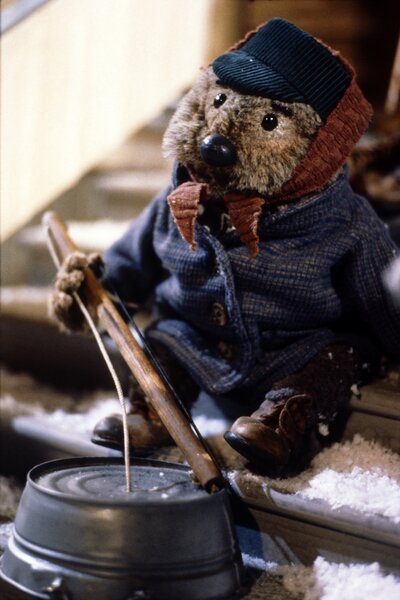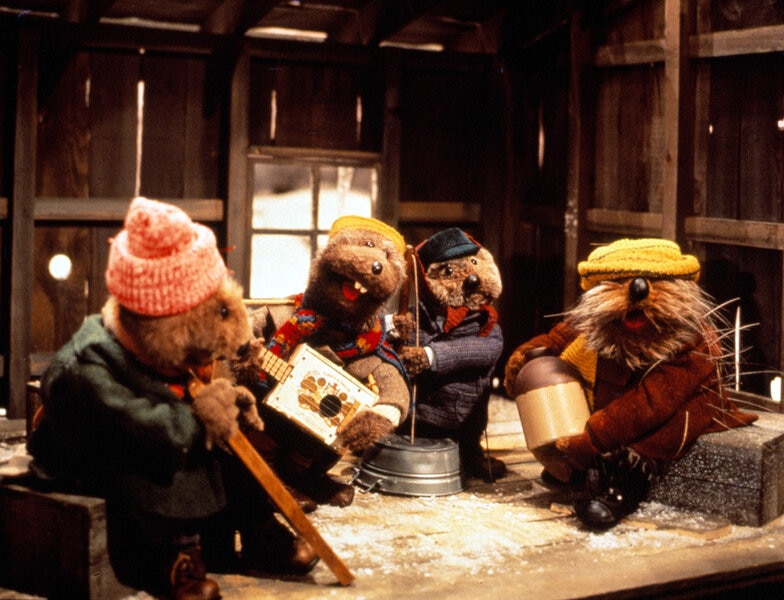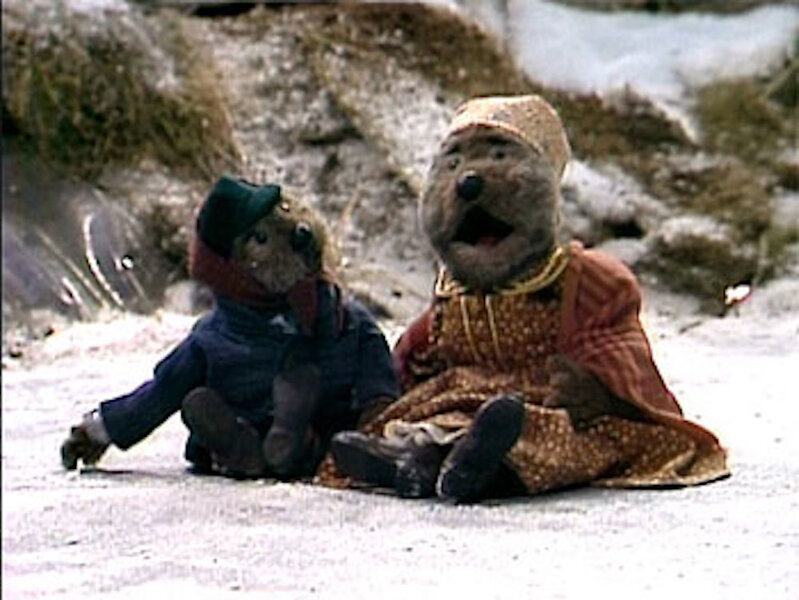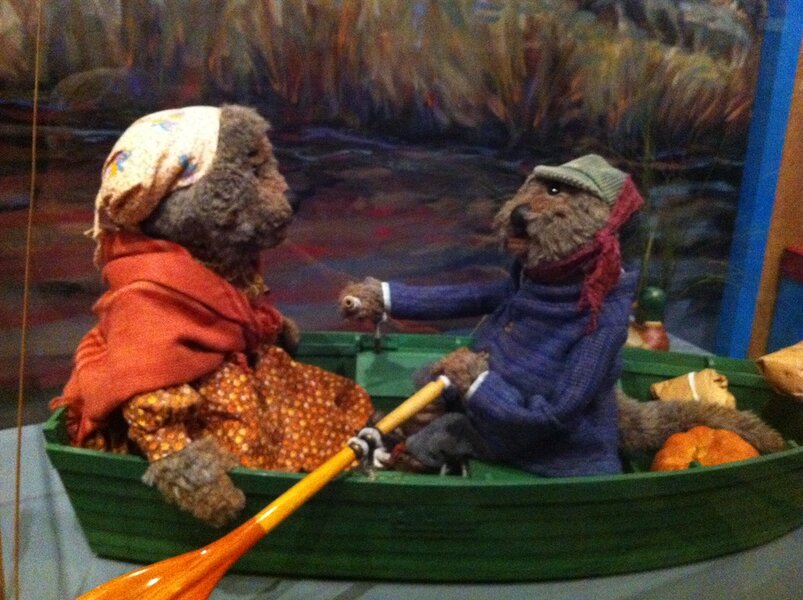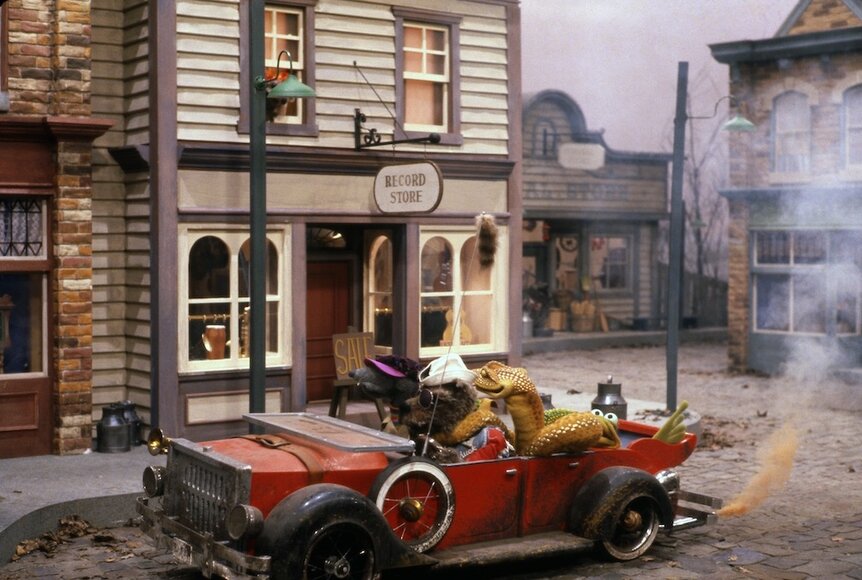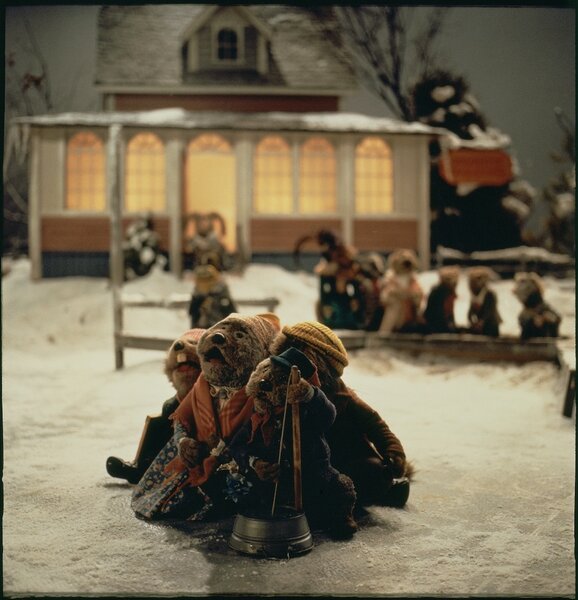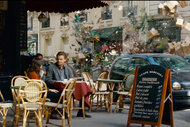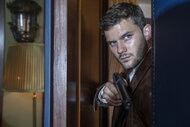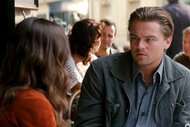Create a free profile to get unlimited access to exclusive videos, sweepstakes, and more!
Emmet Otter's Jug-Band Christmas Oral History: Behind the Scenes of Jim Henson's Holiday Classic
'Tis the season to remember the enduring legacy of this classic 1977 holiday special.
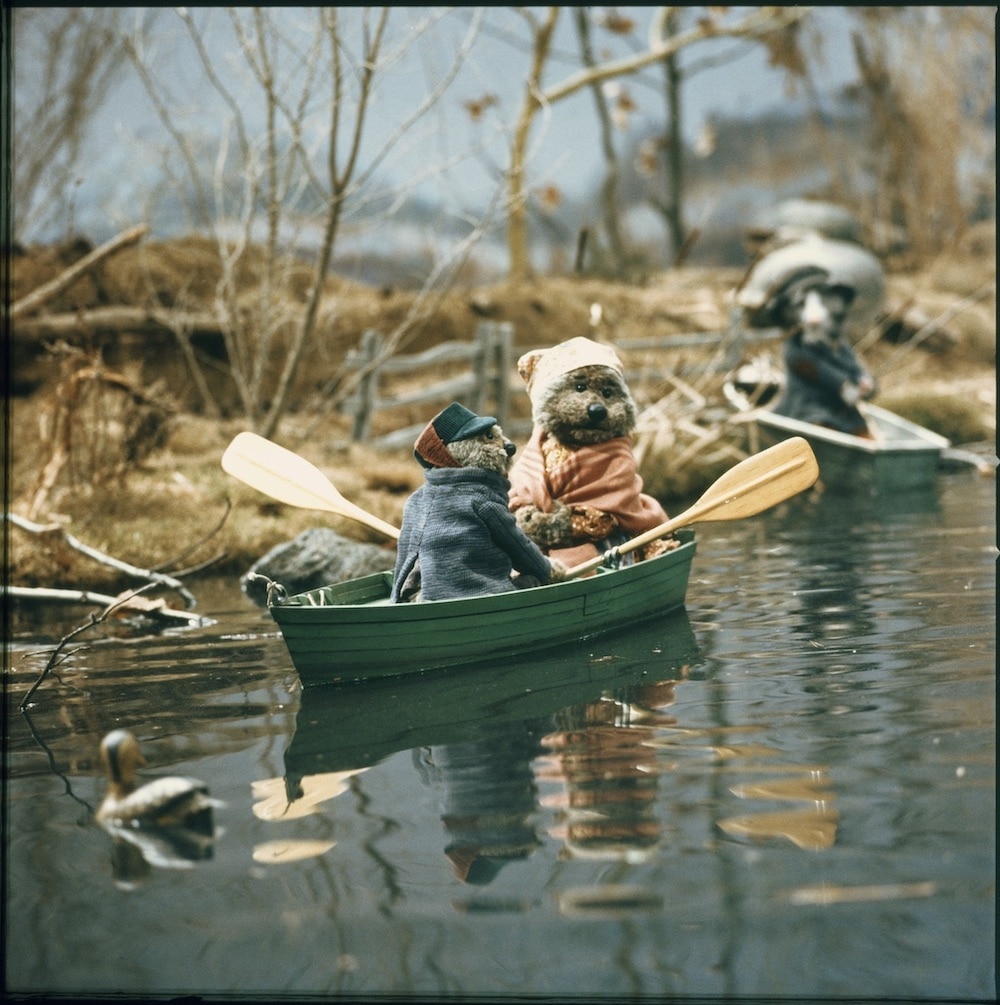
There are plenty of holiday specials out there in the world, but only the rare few achieve classic, annual-part-of-your-family-viewing status. In its 47 years of existence, Jim Henson's Emmet Otter's Jug-Band Christmas (now streaming on Peacock) has taken the slow and steady path from cult appreciation to larger-scale greatness. While it's certainly still not a special that gets the kind of heavy rotation enjoyed by A Charlie Brown Christmas or Rankin/Bass' Rudolph the Red-Nosed Reindeer, Emmet's following has kept this sweet little otter and his Frogtown Hollow friends near and dear to our hearts.
Jim Henson's Emmet Otter's Jug-Band Christmas first graced television screens on December 4, 1977, in Canada on the CBC. It took a year for it to air on U.S. televisions, premiering on HBO on December 17, 1978. At that time, the premium cable channel had approximately 1.5 million subscribers across the country, which meant the special had a very limited audience. While repeated on HBO, it wouldn't get a more mainstream airing until December 1980 when ABC got the rights to broadcast a slightly edited version with Kermit the Frog's narration throughout.
RELATED: From the Grinch to Shrek: The best animated holiday specials, ranked
Fans have extolled the virtues of Jim Henson's adaptation of Russell and Lillian Hoban's book over generations, broadening awareness so much that in recent years there have been special edition DVDs, its first official soundtrack in 2017 from Varese Sarabande, and a revised, live musical stage adaptation of the special that debuted in 2021 at The New Victory Theater in New York City.
The story itself is an adaptation of the illustrated storybook, Emmet Otter's Jug-Band Christmas, written by Russell and illustrated by Lillian in 1971. It — and Henson's adaptation — tell the tale of young Emmet Otter and Ma Otter of Frogtown Hollow. They live a financially strained life since Pa Otter passed away, washing clothes and doing odd jobs to stay afloat, but they thrive on the simple pleasures of sliding down fresh ice slides or singing songs together by the fire. But when they each hear of a local talent show offering a $50 prize to the winner, they separately scheme to enter so they can win the money to buy presents for the other.
For the project, Henson brought over a relatively small band of his Muppeteers, including Frank Oz, Jerry Nelson, Dave Goelz, Richard Hunt, Eren Ozker, and various technicians, including special effects whiz Faz Fazakas, to bring the special to life. While the story was sweet and gentle, Henson wanted the techniques and scope of the visuals to be groundbreaking and assist the storytelling in subtle but impressive ways. The special was also an unofficial audition for singer/songwriter Paul Williams, who wrote all of the film's original songs and the score. The success of this project led to Henson hiring him to score and write the songs for The Muppet Movie.
An Oral History of Emmet Otter's Jug-Band Christmas
Last year, to celebrate its 45th anniversary, SYFY WIRE collected stories from several of the film's key players, including Williams (songwriter/composer), Oz (performer of Ma Otter and voice/performer of Chuck), Goelz (voice and performer for Wendell Porcupine/Catfish/Will Possum), Marilyn Sokol (voice of Ma Otter), Cheryl Henson, the daughter of Jim and president of the Jim Henson Foundation, along with Timothy Allen McDonald, the producer/co-book writer for the live stage adaptation, to reminisce about the special, which remains a career highlight for each of them.
Collecting the Henson Performers
Henson and the Muppets had been part of Sesame Street since 1969. In 1976, The Muppet Show was commissioned by Sir Lew Grade for ATV to be produced in the United Kingdom, and the whole troupe moved to the U.K. to produce the weekly series.
Cheryl Henson: London is where The Muppet Show was done, and my father was in London a lot of that year, so Donald Sahlin really was running the New York build at the Workshop.
Don was the lead puppet builder for the Muppets for many years. He built Rowlf the Dog from my father's sketch and he built Ernie and Bert from my father's sketches. He's a wonderful, wonderful puppet builder, and he was the lead designer on Emmet Otter, and it was a project that was very, very important to him. He worked very hard on it. Everybody said, "Oh, Don loves this. He's really working so hard on it. It's become kind of an obsession. He's working on it crazy hours, you know?"
RELATED: Every Muppet Holiday Special, ranked
Frank Oz: Well, you know, at that time, we were doing so much work. And this is one of the things we're doing. And so it was, for me, another gig, another job for Jim. But it was special in that it was very sweet. Jim took chances on just being sweet and there's a lot of power in that. It was also just the fun of performing not with special effects or anything. It was just kind of nice to do that.
Emmet Otter's Jug-Band Christmas went into production in Toronto in March 1977, working from a faithful adaptation by screenwriter Jerry Juhl. This special was Juhl's second holiday script for the Jim Henson Co., his first being The Great Santa Claus Switch television movie that aired on CBS in 1970. One of the additional Muppet voices in that movie was New York City-based actress Marilyn Sokol (Foul Play).
Marilyn Sokol: I grew up on (Jim's] Wilkins Coffee commercials. So, what happened was, I auditioned for a workshop. I read an ad in either Show Business or Backstage and I came in and Jim asked me to join the Sesame Workshop, and that's how I started working with all of them.
It was very, very exciting. Very special, you know. It just made me feel so fortunate and the people who were in the workshop were fabulous. I didn't start doing Sesame Street till after The Great Santa Claus Switch. Back then, [Henson said] he really loved my voice, but my (puppet] manipulations sucked though. I was not a good manipulator at all. But he used to come see me perform a lot.
[For Emmet) Jim asked me to voice Ma and then we started. As I recall, he started to have me read some of it and he worked on my regionalism, you know. He worked on my New York accent. I was just taking direction from him. He was the boss and, of course, I loved it. I loved the project and I loved the role and I just wanted to follow his direction. That was the main objective from my point of view. Frank Oz had my voice after we had worked on it for a long time. So, he had it to work with and could manipulate the puppet to my voice.
Behind the scenes in the shop, Henson was selecting additional performers to play supporting characters alongside key characters performed by himself (Harrison Fox/Snake), Frank Oz (Ma Otter/Chuck), and Jerry Nelson (Emmet/Doc Bullfrog). Former Hewlett-Packard tech employee-turned-puppet creator and up-and-coming performer Dave Goelz was drafted along with Richard Hunt (Charlie) and Eren Ozker (Gretchen Fox/Hetty).
Dave Goelz: We did a long build for it and I was working in the workshop at the time. I don't remember being asked. I think it was just a given that I'd be involved. You see, when I joined Jim, I was interested in performing. I mentioned that to him. And he said, "Well, we have three star performers. We're fine for most of the time, but when we do a special, we use extra people, and we could work with you then. And I'll work with you in the meantime to hone your skills." And Jim was as good as his word. Always.
So, we were building puppets and I think while I was building Catfish, Jim might've said, "Would you like to do him?" But I'm not sure when I learned about Wendell. Rollie Krewson built Wendell. [When it came time to pick his voice] I think I just tried that voice and Jim said, "Yeah, that's nice." It was so informal, and Jim would just have us [try things], or he'd say, "Well, Richie [Hunt], try the guy with the kazoo." He would just work it that way and then he'd say, "Oh, that's nice. Okay. That's good." or "Would you like to give this a try? I'd like to have you try such-and-such." And that's how he did it.
He cast because he knew everybody really well. He had a sense of who could do what, and what would be a stretch, and what would help a performer grow without exceeding their capability. He was just wonderful in that regard. I only auditioned once in my whole time with Jim.
From the Jug-Band to the Traditional Carols, Paul William's Musical Landscape
Emmet was created to have a strong musical spine, so Jim needed original songs and music to underlay the entire special. One of the most successful songwriters of the time was Paul Williams, who was already writing hits for Three Dog Night, The Carpenters, and Barbra Streisand.
Paul Williams: I was asked to go and appear as a guest on The Muppet Show [Season 1, Episode 8] and when I showed up on set to meet everybody, I was already a huge fan. I was not aware of The Muppets in general, but I remember seeing some of the stuff on The Ed Sullivan Show when I was a kid. But on the road with my band in the 1970s, part of coming to — because those were crazy times — was Sesame Street. Whether you were home in Los Angeles, or if you were in some godforsaken, tiny, little Mid-American spot where you weren't quite sure what town you were in, you'd get up in the morning, you turn on Sesame Street, and there was some very hip humor there, so we were all big fans.
So, I met Jim and everybody. It was like being around old friends and there was a kindness with a side order of cynical humor that really felt like a great match for me, and I think it did for Jim as well. Almost immediately, Jim asked if | would be interested in doing Emmet Otter's Jug-Band Christmas. He said, "We're gonna do an HBO special. It's a little different. We're trying some stuff with the Muppets we haven't really done before, but it feels like it might be a nice fit."
RELATED: From Farscape to Five Nights at Freddy's? The Connection Between the SYFY Classic & Horror Hit
I think what he was actually doing was giving it a test ride to see how we worked together. Because what was major on his plate at that time was The Muppet Movie coming up. It was a huge gamble, and I think one of the things he was wondering is if I would be the right guy for The Muppet Movie.
The songbook for the special ended up having a traditional, Americana tone. It wasn't the style of music Paul Williams was normally composing, but he ended up writing nine original songs (including one not aired and recently restored for the soundtrack called "Born in a Trunk").
Williams: It's funny because I've never had songs write themselves as quickly as these songs wrote themselves. And some of the titles are [from] the book. With Emmet Otter's Jug-Band Christmas, you have this remarkable tale that has such depth. I think it's written in such a way that the titles, and the story, led me to what we would now call Americana, and it's not what I did. I think probably as close as I got to that style is one of the songs that Jim mentioned when we met. He said "I just loved you from the time I heard "Old Fashioned Love Song." And though "Old Fashioned Love Song" was really kind of rinky-dink, old-fashioned, there was something about that song and the simplicity of my melody that he lit up around it.
So, I went to the script [for inspiration], and I think that the script is a wonderful fairy tale with a great spiritual lesson in it. Ma Otter and Emmet take a chance, and they basically destroy their means of earning a living with the washtub and hocking the toolkit. As brave and as wonderful as they are, and as much as we're rooting for them, the fact is that they are outperformed by a hard rock group, The Riverbottom Nightmare Band. But from that, there's that wonderful opportunity to write two songs that, put together, make one song, but also have a message like "Our World" and "Brothers." It was a marvelous opportunity for a songwriter.
And I was absolutely careless, and it's amazing that the gods shined on that production. I don't remember, I think I may have gotten some gentle keys from the actors, but we were flying by the seat of our pants a lot. And I never wrote for Jerry Nelson, I wrote for Emmet. The characters are so absolute and so alive. So I took my own road band and I wrote the songs really quickly. As I listen to them now, I'm amazed at some of the complexity of it.
"Once a pirate tried to steal it. It was rumored he was gonna use it for a pirate sail. I'm innocent of such an act, he cried the fact that it's a perfect diaper for a baby whale." It's interesting cause there's a heavy hit there of so much internal rhyme. It has all those words, and yet it sings easily. I swear to God, there's some sort of grace that you sometimes get in the midst of a project like that; the gods are with you.
With the songs written, it came time to record with the cast in Los Angeles so the production unit could perform and sync to the tracks on set in Toronto. It only took a few days to record all of the songs.
Sokol: I recorded the music in California with Paul Williams. It was fabulous. Jim was very proud because we had worked so hard on everything. He was, in essence, showing Paul our work. "When the River Meets the Sea" was a big deal. And then, ["Hole in the Washtub"]: "Head full of good thoughts, belly full of grub. Money in your pocket when there ain't no hole in the washtub," of course. It just sounds like Paul. It's his personality, very, very exciting and excitable.
Jerry Nelson and I had sung together on Sesame Street and we sang together on this. Jerry was a very special guy. And I'm sure that when he passed, Jim missed him terribly. I adored Jerry. He was really, very wonderful and so different from me. When he was in the Workshop, that's when I met him. He was so gentle and so helpful. And obviously so gifted. I'm saying that his movement was so legato, so graceful. It's as if he had no elbow.
Williams: The combination of Jerry Nelson's voice as Emmet, and Marilyn's as Ma Otter was just magical. It was a beautiful blend.
Goelz: I was always uncertain because I'm not a good singer. I'd go into the recording studio with a little bit of trepidation and just try to carry it off with character, and make the character work. It was just fun to be a part of all that stuff. Whenever Paul Williams writes music he channels it. He just brings it from the heavens somehow.
Henson: I loved "When the River Meets the Sea," and I actually learned it for an audition piece when I was in high school when I was 17. That song really spoke to me as this gorgeous, new gospel song. And we have continued to play that song and sing that song at any memorial service and many times for many occasions.
How Emmett Otter Advanced the Art of Puppetry
The puppets and environments created for the shoot in Toronto retained the homespun, warm look of the Hoban's book, but Jim wanted to push forward some puppetry advancements, especially in how they built and used the sets in three-dimension. The team also created special remote-controlled performance puppets and rigs they actually built on the set for wide shots on the river.
Henson: I remember [my dad] bringing the book home and being very excited about the illustrations and about what cute puppets they would make, and about making these two-dimensional illustrations into a three-dimensional world.
My sister, Lisa and I, when we were growing up, we did a lot of doll play. We had really elaborate dollhouses that my father made. My younger sister, Heather, had a very active imaginative life with her stuffed animals. So, creating worlds in miniature was very much a part of our whole growing up. I think that's one thing that was particularly delightful about the idea of this show, and they created such beautiful, beautiful miniature worlds.
Goelz: What I love about Emmet Otter is that it truly comes from the heart. It is so sweet. It's about the absolute best that we can be.
RELATED: Farscape Creators Reunite, Look Back on Pushing Henson Creatures to the Max on SYFY Series
And it's two things at once. Technologically, it's very advanced for its time in one way, and in another way, it's rustic. It's so charming and I love it all the more because of that. But at the same time, we did have a 60-foot-long river going all the way across the studio. And Faz Fazakas built this amazing rowboat that could do anything that a real rowboat could do. It was completely maneuvered by rowing in the wide shots. And we covered them in close-ups by putting the boat on a stand in front of the river and shooting over it with a little bit longer lens so we could use hand puppets inside for close-ups to get better manipulation.
But in the long shots, the boat was rowing Emmet, I should say. The boat had a mechanism in it that made the rowing happen, and that moved Emmet as though he was causing the rowing. And of course, he could talk, and move his head, and turn around, turn his head, and tilt, and nod. And his mom could do the same thing all by radio control. Jerry (Nelson) was doing it from a distance with radio control in the long shots. And Frank Oz, who was performing his mother in the studio for the shoot, was working the radio controls for her.
Henson: A new technique that they used was a video wipe to wipe out the top half of the frame and take away the marionette bridge and the puppeteers. I believe that's the first time that Jim did that to that extent. My father used a lot of video technology throughout The Muppet Show and in other specials, and he always enjoyed playing with video technology in order to enhance what he was doing with the puppets.
In Emmet Otter, the number of times you have the characters walking across the bottom frame looked quite magical because you cannot see the strings at all. Back then, you couldn't do rod removal. Now they do rod removal, which is incredibly complex technology. All they did in Emmet Otter was just wipe off the top half of the frame and replace it with that same location without the bridge. It's the easiest video technology in the world, but it really worked.
It's fun to talk about the cutting-edge technology that was starting there, but what I think makes the show particularly great is the traditional puppetry being used carefully. It's handmade. Ma is hand-making her dress, Hetty is spinning, and Emmet is hammering and making things. I think that is a part of the story.
Goelz: A lot of the things that were built were standard puppets. Like Catfish was easy. We worked with a rubber glove inside the fish that was glued to the bucket that he lived in. And later on, in the concert, he was in a big plastic tank and there was a scuba arm glued into the side of the tank, so I worked from behind.
Those things were just uncomfortable, as is a lot of the work we did on that show because we were working through holes in sets. And that invariably does not work out well for us personally, as people, because there'll always be a beam under the set right next to the hole occupying the space where our head is supposed to be. It meant moving our heads around the beams somehow. It was painful and uncomfortable.
For Will Possum standing on the river bank, it was one of those situations where I was working through a hole and my head had to be removed from my body for a while. It was hurting so much that I was whimpering, saying, "Can we shoot now? We gotta shoot now, please." And Frank was outside but he kept saying, "You're whimpering. Stop whimpering." And I was like, "No please, we gotta shoot." [Laughs.]
Williams: Here's what I think is really important about what Jim did. I think that Jim does 80 percent of the work and puts it on the screen, and then there's 20 percent that the audience brings. If you look at Emmet Otter's Jug-Band Christmas, the marionettes are so awkward you can actually see the strings, and I think it's brilliant. The fact is, as an audience watching Emmet Otter's Jug Band Christmas, part of what we bring to it is we don't ignore the fact you can see the marionette's arms or that awkward little walk on the ice. I think that's an entryway into [thinking], "I'm going to be an absolute child and give myself to this completely."
When you think about it, Jim could have very easily have done a nice, tight, waist-up shot where you didn't see any of the movement, just like on The Muppets where we're just seeing the top half of the body. But what we got from that ancient craft of marionettes and Americana is a chance to bring a total commitment to this wonderful, wonderful piece.
Magical Moments in Frogtown Hollow
The special itself has scene after scene of memorable moments from the comedic to the tear-inducing, and the performers say finding those moments at the time were just as impactful and special.
Henson: I went up to visit and spend some time up there, and while I was there | got to puppeteer an audience scene when they had the talent contest. At one point, I got to do some with the squirrels. I was not officially on that production and I only did just a little, tiny bit.
Goelz: The talent show was memorable. The squirrel acrobats, that was a funny piece. Jane Henson worked one of the squirrels and her voice is very prominent in the final mix. You hear her squealing and talking while the squirrels are performing, and it's just so much fun to listen to. I remember how much joy she got from doing that. And how silly it was. It was just silly puppetry. It was just squirrels on rods and you just twirled the rod and it looks like the squirrel is spinning.
And then backstage during the talent show, with the possum, we pinned his hands to the curtain rope, and all we did was have somebody pull the rope one way and then the other way, so it made it look like he was working the rope. It was just a perfect use of puppetry. It was so simple, and yet it was utterly convincing, even though his hands weren't really doing anything.
On the DVD deleted scenes, I was just watching when the drum rolled out of the music store in front of Emmet and his mom. That took so many takes. That was our record for the [highest] number of takes. The drum worked perfectly, and then we started shooting and it didn't work for forever!
Oz: I was underneath there with Jerry Nelson, who's a brother. We were just having a lot of fun knowing that, and laughing at the fact that we did it perfect during rehearsal. We did it perfectly and then took all those takes! We were just having a lot of fun. It was a blast. But you get your arms very tired and that's why all of a sudden we'd collapse because our arms are up there all the time. [Laughs.]
Goelz: There's Wendell's line: "You got mashed potatoes?" Jerry Juhl wrote that line. When we shot it, I threw in a little homage to my father when he said, "Peachy keen." It was something that my dad used to say when I was a kid. He'd say, "Oh, that's peachy keen." And so I just threw it in there so that when he was watching it, he would get a little message from me.
The Riverbottom Nightmare Band sequences were also crew and audience favorites, due to their bad-boy personalities and glam rock performance at the talent show.
Goelz: Oh, it was hysterical. We just had great fun, especially what Frank did with Chuck. Chuck was the kind of leader who didn't have to say much, 'cause the boys knew he was furious.
RELATED: Hop aboard Moya with all 4 seasons of 'Farscape' & 'Peacekeeper Wars' now streaming on Peacock
His, "I'm huuuungry," was just Frank doing so much with so little. And my guy, the fish, he was just ridiculously stupid. And I had fun performing him that way.
Frank Oz: I love Chuck! I don't really think about [finding character] when they come up. I just harkened back to my days in Tech High when there were tough guys, and everybody respected them. I just exaggerated it to make it even worse. Sometimes it just hits you.
Goelz: When the River Bottom Band was playing [in the show], my fish was in a clear plastic cylinder, a big tank. I was sitting on a chair on a forklift truck behind it, all blacked out, and I was working through a black curtain. Like I said, it was a scuba glove glued into the tank so that I could put my arm into the scuba glove, it was like an arm and a sleeve and a glove, and somebody out in front would put Catfish on me, and then I would perform.
But I was trapped! I was just sitting there with my arm glued to this tank wondering what would happen if somebody came along and accidentally let the forklift truck go down. If that went down, my arm would've just been severed at the shoulder. I was a little worried about that. I kept saying, "Who's working the forklift truck? Don't do anything."
Williams: It's interesting because, especially in the midst of something that is this lovely — kind and sweet and innocent — there's a part of your inner demon that just wants to air, you know: "I just need to be evil."
And the fact is that the Riverbottom Nightmare Band song is like a parent's worst nightmare. To have somebody talk about, "We don't brush our teeth cause our toothache helps us stay mean." Or "the grass does not grow in the places where we stop and stand," it's so much fun to just dive into that kind of playful evil.
The Enduring Legacy of Emmet Otter's Jug-Band Christmas
What Henson and his team accomplished with Emmet ended up having an important impact on projects that came after because the special ended up being proof of concept for some ideas he was developing at the time.
Henson: He was very, very proud of it. It was a wonderful production, but I also think the whole thing of creating a world that is completely self-contained, that doesn't have any humans in it, where you're not really aware of the scale because there aren't any humans, I feel like that led directly into The Dark Crystal.
He was talking about doing an epic fantasy film where there are no humans, where it's only the puppet characters, and Emmet Otter was sort of the first of that. A lot of what he learned from Emmet Otter then moved right into The Dark Crystal. There was a similarity there with my dad working with an illustrator whose work he really related to and wanted to bring to life. In The Dark Crystal, he really wanted to bring Brian Froud's world to life, not just an individual illustration or individual character, but to bring that entire world into existence. I think that that's similar with Emmet Otter, with the attention to detail that says this is not just an illustration; this is an entire world that this story is taking place in.
Three decades later in 2008, the Goodspeed in Connecticut collaborated with The Jim Henson Company to adapt Jim Henson's Emmet Otter's Jug-Band Christmas into a brand-new stage musical. Utilizing the music and lyrics by Paul Williams with a book by Timothy A. McDonald and Christopher Gattelli, the musical mixed human actors and recreated puppets from the TV special by Jim Henson's Creature Shop to tell the story in the special. In 2021, The New Victory Theater in New York City, revised the show with the same clear intention of bringing the story and Henson's puppet artistry to a new generation.
Timothy Allen McDonald: When we originally staged the show at Goodspeed many years ago, we opened with the original Emmet and Ma puppets in their rowboat. Now those puppets are in a museum (as they should be). Chris and I were adamant that we had to recreate those puppets. Fortunately, Rollie Krewson from the Jim Henson Creature Shop, who built many of the original puppets for the special, was able to build Ma and Emmet for our production. We also wanted to see the Jug-band as puppets in the treehouse.
Ultimately, Chris has created a beautiful visual language in which puppet scale and human scale are used throughout the show. Plus our sets by Anna Louizos and costumes by Gregg Barnes gorgeously pay tribute to the special. And the Hensons' vast knowledge of how the puppets work and how to create “Henson magic” has been immensely helpful. They also brought John Tartaglia onto the project as our puppet director and his skills and knowledge are deep. This knowledge came in handy many times, but especially during the Talent Contest — which is 20 minutes of world-class puppetry performed live on stage.
Each of those who collaborated on the special still regard it as one of their favorite career projects, even 47 years after it first aired. To this day, they all say meeting fellow Emmet fans is still a special moment of connection.
Sokol: I'll tell you, I live near Gramercy Park and so does Jimmy Fallon. When I saw him near the park, I introduced myself and I said, "I'm Ma Otter from Emmet Otter," and he just leaped up and hugged me. It was really, really gorgeous.
Goelz: I just trust that we know that if we do good work, what we feel is good work, then there'll be some people out there who agree.
And what I really remember about that music is "When the River Meets the Sea." I didn't sing on that. but I used to sing my kids to sleep, and that was one of the songs I would sing for them every night. It was this lovely song about facing life calmly; knowing that it will end, but you'll do it with grace. I don't know how Paul Williams does it, but that song is just infinitely beautiful.
McDonald: Emmet and Ma’s story is about love, kindness, taking positive risks, and having faith. These are themes that have always been important to the human race. After the trauma we have all endured during the pandemic, we could use a lot more kindness, don’t you think? Oh, and being in the same room with 30-plus puppets is guaranteed to make you smile, and think, “It’s all going to be okay.”
Henson: I hope that new audiences will discover it because it is such a beautiful piece. It's a good time in our country's culture right now to celebrate a story about regular, hard-working folk.
Oz: First of all, it's the vision Jim had and the songs of Paul. But also just the simplicity and purity. There's all these big special effects now and big, loud Santa Claus stuff, when this is a very quiet piece and a very sincere piece. It really is an anomaly these days when you look at that. I think that the sweetness and the simplicity of it, and the very beautiful music, and Jim's whole vision of it was very pure. That's what really gets me.
Williams: It's like a family. I managed to stumble into the sweetest bunch of people ever, both the furry, felt ones, and the voices and hands behind them are just the nicest people I've ever worked with. And the best part about working with Jim and the Muppets is that amongst all the Muppets, all the actors... and everybody in that company, when Jim was gone, Jim was not gone. There was an essence of how he treated people that is a continuation in everything the Muppets do.
And the success of Emmet Otter's Jug-Band Christmas belongs to not just the Muppets and all of us that worked on it, but [to] these sweet people that saw it and loved it. It would have disappeared, but they played it for their kids, and they played it every Christmas. And then when their kids got married and had kids, they played it every Christmas for their kids. It's built through the years, and I think that's a gift for Jim, and a gift for all of us.
We have to recognize that the success of this piece is really in the hearts and in the hands of — I can't even call them fans. At this point, when somebody comes up and says that they love Emmet Otter, or that their daughter is learning to play "Rainbow Connection" on the piano, they're past being fans. They're now becoming family in a way, as well. So, they're good friends, and I think we all need to make sure that we thank the people that keep this thing alive.
Emmet Otter's Jug-Band Christmas is now streaming on Peacock.
Originally published Dec 9, 2022.
